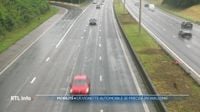Since 2024, discussions have been underway regarding the implementation of a car sticker system for certain roads in Belgium, a move that has sparked both interest and debate among motorists. The idea, which has been championed by Walloon Transport Minister François Desquesnes, aims to ensure that those who utilize the roads contribute to their maintenance. In a statement made in September 2024, Desquesnes remarked, "It is quite logical that those who use our roads pay for their maintenance and good condition." He drew comparisons to other countries, stating, "When you go to France or Switzerland, you have to pay to drive on the highways." This sentiment reflects a growing trend towards user-pays systems in transportation.
On April 15, 2025, during a parliamentary commission in Wallonia, Desquesnes elaborated on the proposed car sticker system. He confirmed that both Flanders and Wallonia are considering a fully digital approach, stating, "I can confirm that Flanders and Wallonia are considering a completely dematerialized system. No little paper, no little plastic to stick on the windshield." This digital strategy aims to streamline the process for drivers while reducing the environmental impact associated with physical stickers.
The proposed system would involve the pre-registration of vehicle license plate numbers prior to using the designated road network. Desquesnes explained the enforcement mechanism, which will include license plate reading cameras and ground teams to monitor compliance. This high-tech solution is designed to make the system efficient and less intrusive for drivers. For those who may not be comfortable with digital technology, there will also be an option for a physical sticker, ensuring inclusivity.
The duration for which the sticker can be purchased is flexible, with options ranging from a single day to a full year. This allows motorists to choose a plan that best fits their driving habits. However, as of now, the regions of Flanders and Wallonia have yet to reach a consensus on the final details of the system, including pricing. Currently, no specific costs have been announced, but for reference, a similar sticker in Switzerland costs approximately 42 euros per year.
As for the timeline, Desquesnes indicated that Wallonia is aiming to implement this system by 2029. This ambitious goal reflects a proactive approach to addressing the maintenance of public infrastructure while also considering the financial contributions of road users. The introduction of such a system could potentially lead to significant changes in how roads are funded and maintained in Belgium.
The proposal has garnered mixed reactions from the public. While some citizens recognize the necessity of maintaining roads and are willing to contribute, others express concern over the added financial burden, particularly for those who may not use the roads frequently. The debate continues as stakeholders weigh the benefits of improved road quality against the potential costs to drivers.
In conclusion, the proposed car sticker system in Belgium represents a significant shift in transportation funding. With its focus on a digital, user-friendly approach, the initiative aims to ensure that road maintenance is funded by those who benefit from it. As discussions progress and details are ironed out, it remains to be seen how this plan will be received by the public and how effectively it can be implemented by the targeted timeline of 2029.




